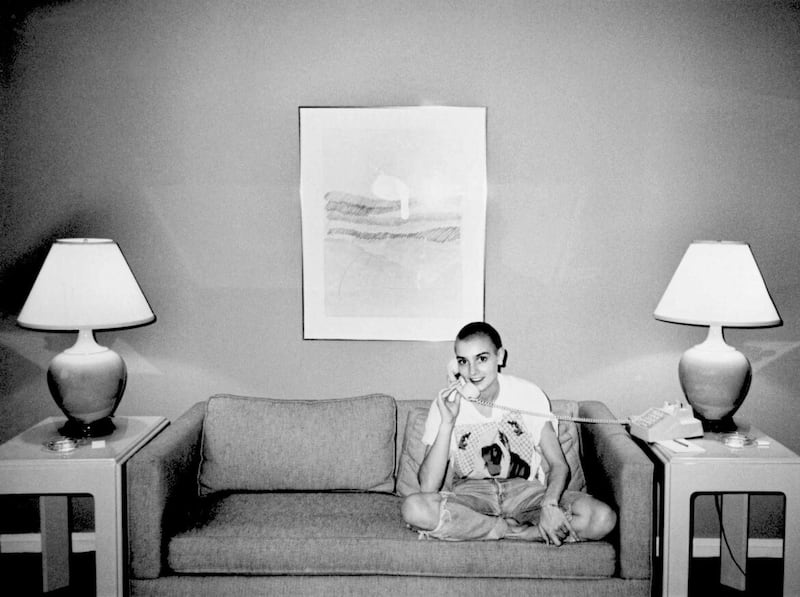“IT JUST feels like it’s time for this film, doesn’t it?” says Nothing Compares director Kathryn Ferguson of her new documentary on the rise and fall of Sinéad O’Connor.
The new film reminds us how the Dublin singer, who topped the charts around the world in 1990 while speaking out on issues such as racism, sexism, abortion and contraception, and just two years later was effectively ‘cancelled’ by the mainstream media and entertainment industry for ripping up a photograph of the Pope on live TV as a protest against the Catholic Church’s cover-up of child abuse – a scandal which would not be properly exposed for another decade.
“I think any response to the film is just people responding to Sinéad – the fact that people are finding her again is what’s causing the furore,” comments Belfast-born Ferguson of the documentary co-written with her producers Eleanor Emptage and Michael Mallie, which premiered at the US Sundance film festival in January and has since won the Docs Ireland Audience Award and Best Documentary at the Galway Film Festival.
“I think another reason why there is so much interest in the film has a lot to do with where we are politically in the world right now. When we launched at Sundance in January, we couldn’t have dreamt in our worst nightmares what would go on to happen in the States. In many ways, the film has accidentally become a call to action for young women over there.
“They can now see this amazingly brave, iconic human being and all that she stood up against and for, and I think they find her very inspiring.”

Last week, Ferguson received a BFI Filmmaker Award for directing and co-writing her first full-length feature documentary, which opens in cinemas today. Outlining O’Connor’s troubled upbringing in the stiflingly patriarchal, Church-dominated Ireland of the 1970s and early-1980s and how music offered an escape route from teenage delinquency and indefinite incarceration at a workhouse for ‘fallen women’, Nothing Compares focuses on a meteoric rise to fame which began with a move to London and the release 1987’s debut album The Lion and The Cobra.
The doc mines a wealth of archive performance and interview material along with rare candid footage to showcase O’Connor’s magnetic star power, ferocious singing voice and thoughtful eloquence when speaking on issues close to her heart. She also narrates the film through audio clips taken from reflective interviews conducted with the star by Ferguson in 2019, supplemented by contributions from those closest to her during her turbulent rise to fame and testimonials from fellow musicians like Kathleen Hanna, Peaches and Chuck D.
Read more:
- Director of Sinead O’Connor documentary ‘devastated’ at singer’s death
- Sinéad O’Connor documentary Nothing Compares coming to TV on Saturday night
Although Ferguson was denied use of the Prince-penned title track by his estate at the last minute, there is an abundance of O’Connor’s other music on the soundtrack. The absence of such a key track actually serves the narrative at hand, with out-takes and rushes from the iconic Nothing Compares 2 U video instead set to an evocative ambient score as O’Connor explains how that famous tear captured by Dominique Le Rigoleur’s close-up camera was provoked by grief for her recently deceased mother, whose mental instability had fuelled a fractious, occasionally abusive relationship with O’Connor and her siblings.
As Ferguson explains, her motivation in making Nothing Compares was to highlight the injustice of how O’Connor was punished for being ‘outspoken’ and refusing to play by the rules – the very qualities which made her so appealing to many young fans, including the director herself.
“My father was a huge fan of Sinéad’s,” explains the film-maker, who is based on England’s south coast, “he got The Lion and The Cobra and played it on repeat throughout my early childhood as we’d be driving around rainy, grey Northern Ireland.
“She would just be blasted out of the car speakers, so that album became this very visceral sound to my childhood. Then in the early-90s, when I was in my early teens, I found her on my own two feet. She became a real idol for me and my friends – this amazing superstar from our own country.
“It was just so exciting: we loved the music and we loved how she looked, and we really admired her boldness. But then really, we were very demoralised as young women, to see the backlash and to see how she was treated.
“We felt as soon as we’d found this incredible icon of ours, she was just really publicly destroyed, and it left a huge dent on me as a young woman. And I think that’s honestly where the seeds for the film were sown, it had such an effect that stayed with me for the following decades. And then I became a film-maker.”

It was in 2011 while completing her masters in Visual Communication at London’s Royal College of Art that Ferguson “cheekily” and successfully reached out to O’Connor for permission to de-construct some of her music as the soundtrack for her short film, Máthair.
Two years later, the O’Connor camp contacted Ferguson to ask if she would like to direct her childhood hero’s first music video for 15 years, 4th & Vine. Naturally, she agreed.
“I’ve met a few of my idols, but nothing could have prepared me for meeting Sinéad,” explains Ferguson, whose film-making background is in advertising, music videos and shorts, including last year’s 17-minute doc Space to Be about the Windsor Women’s Centre in Belfast.
“I’d had this relationship with her in my head for so long that just went way beyond [anything else], it was so much deeper. Actually getting to meet her was phenomenal and that was really where the fires were stoked for making the doc.
“It was something that had always been there, and then it just became ready pronounced – like, I really want to tell this story.
“As a documentarian I was never interested in making a film about a famous person, that was never the driving force. It was a very personal film. As an Irish woman, there were so many of the things that we explore in this in the film that were very personal to me, you know, and to many of us as Irish people. I just wanted to make a film about Sinéad and her story.”

Ferguson’s powerful and stylishly constructed biographical portrait reminds us that while O’Connor’s widely/wilfully mis-understood decision to rip up a photo of the Pope on Saturday Night Live in 1992 may have made the biggest headlines – “Sinéad, She Devil!” screamed The Sun – the knives were already well and truly out for the determinedly non-conformist star by that stage, mostly in America.
In 1990, O’Connor’s decision not to allow the US national anthem to be played before her concert in New Jersey during the height of patriotic fervour over the Gulf War earned the Dublin star an avalanche of criticism from conservative-minded cultural pundits, radio stations and fans alike.
The following year, at the peak of her fame and nominated for Best Record in The World at the 1991 Grammys for the global smash Nothing Compares 2 U, O’Connor shocked the US music industry by boycotting the ceremony, penning an open letter condemning the organisers for their obsession with celebrating “material gain” while marginalising black artists (rap legends and fellow Grammy nominees Public Enemy joined O’Connor in her boycott).
All this culminated in the Irish star’s records, CDs and tapes being publicly destroyed by a steamroller in New York’s Times Square in October 1992, shortly before a good 50 per cent of the audience at a star-studded Madison Square Garden concert honouring O’Connor’s hero and musical inspiration, Bob Dylan, unsuccessfully attempted to boo her off stage.
Thirty years on, there is now a huge promotional poster for Nothing Compares in Times Square, O’Connor’s face looming over the area where people once gathered to condemn her and destroy her music. Ferguson hopes that the overwhelmingly positive responses to Nothing Compares will go some way to healing the deep and long-standing hurt experienced by O’Connor, who tragically lost her 17-year-old son Shane to suicide earlier this year and subsequently announced that she would never perform live again.
“I think the key takeaway with the response to the film is just how much people care about her and wish her the best,” offers the director.
“Hopefully, this film is as inspiring for people at home in Ireland as it has been around the world and everybody will continue to show their love and support for Sinéad.
“I just hope that, if she does ever decide to return to performing one day, she’ll really feel that love.”
:: Nothing Compares is in cinemas now.







